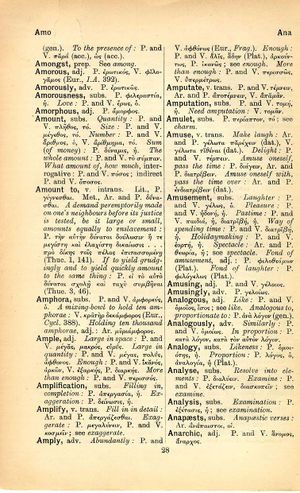amuse: Difference between revisions
From LSJ
νὺξ βροτοῖσιν οὔτε κῆρες οὔτε πλοῦτος, ἀλλ' ἄφαρ βέβακε, τῷ δ' ἐπέρχεται χαίρειν τε καὶ στέρεσθαι → starry night abides not with men, nor tribulation, nor wealth; in a moment it is gone from us, and another hath his turn of gladness, and of bereavement | Starry night does not remain constant with men, nor does tribulation, nor wealth; in a moment it is gone from us, and to another in his turn come both gladness and bereavement
(CSV3) |
mNo edit summary |
||
| Line 2: | Line 2: | ||
|Text=[[File:woodhouse_28.jpg|thumb|link={{filepath:woodhouse_28.jpg}}]]'''v. trans.''' | |Text=[[File:woodhouse_28.jpg|thumb|link={{filepath:woodhouse_28.jpg}}]]'''v. trans.''' | ||
[[make laugh]]: Ar. and P. γέλωτα [[παρέχω|παρέχειν]] (dat.), V. γέλωτα τιθέναι (dat.). | |||
[[delight]]: P. and V. [[τέρπω|τέρπειν]]. | |||
[[amuse oneself]], [[pass the time]]: P. διάγειν, Ar. and P. διατρίβειν. | |||
[[amuse oneself with]], [[pass the time over]]: Ar. and P. ἐνδιατρίβειν (dat.). | |||
}} | }} | ||
Revision as of 11:59, 25 September 2019
English > Greek (Woodhouse)
v. trans.
make laugh: Ar. and P. γέλωτα παρέχειν (dat.), V. γέλωτα τιθέναι (dat.).
amuse oneself, pass the time: P. διάγειν, Ar. and P. διατρίβειν.
amuse oneself with, pass the time over: Ar. and P. ἐνδιατρίβειν (dat.).

